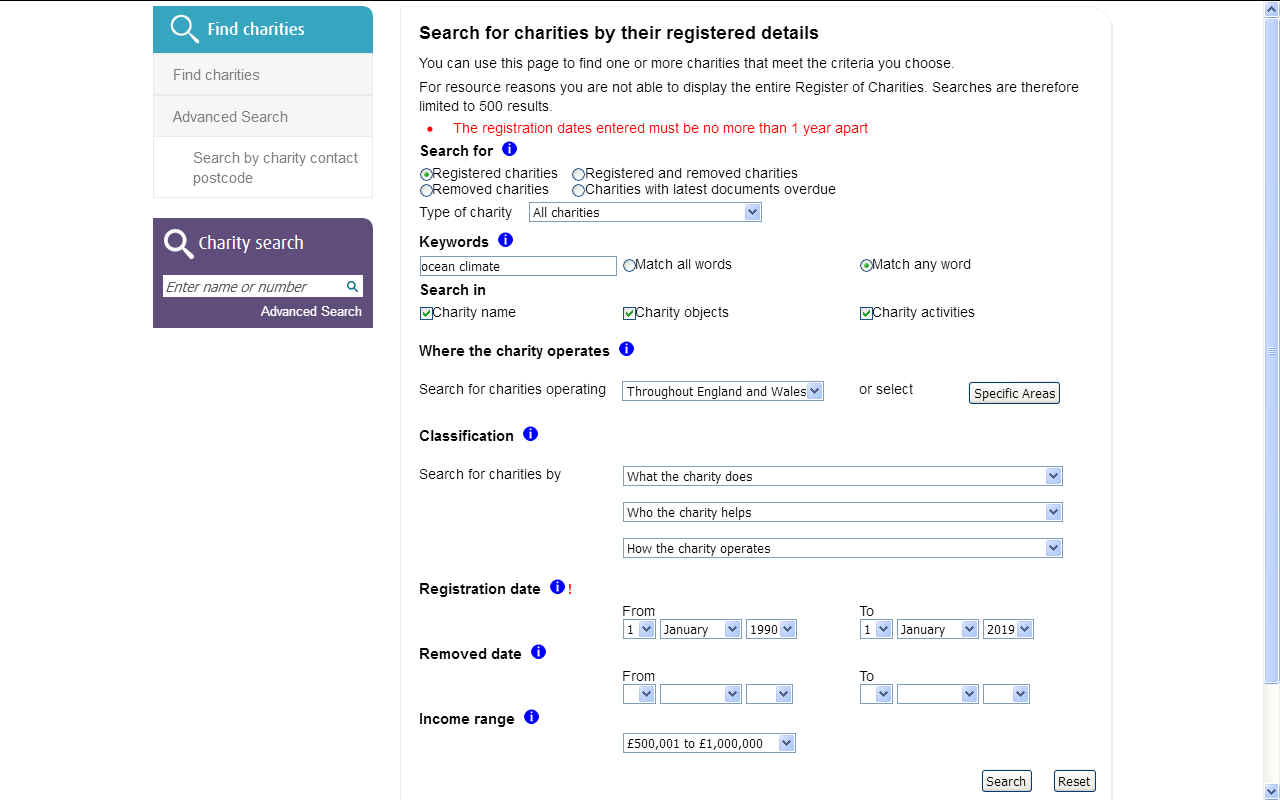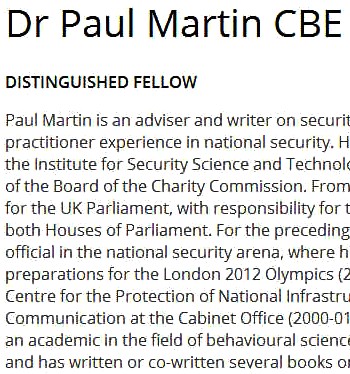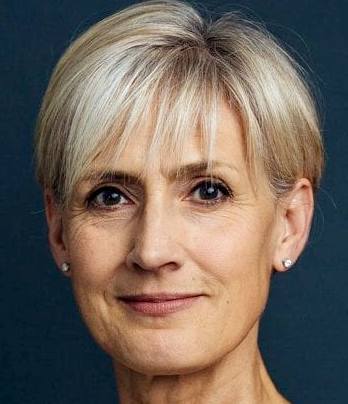|

The
Charity Commission has a set
of rules that are applied with various degrees of stringency such that
applications to be registered are decided on principles that tend to
violate Article 9,
Article
10 and Article 14 of the European
Convention of Human Rights. It appears to depend on who your
Trustees are and how well connected they might be - where some decisions
are not as consistent as they could be, but where their powers of
investigation may sometimes be abused or bent to assist other agencies
who might have an axe to grind, or worse still may have something to
cover up.
We
are keeping a watchful eye on specific cases where the explanations
given are insufficient in one regard or another to make us suspicious as
to the circumstances of refusal. Not that refusal bars an organisation
that operates on a not for profit basis to call itself a charity.
Transparency
is also an issue, where the database is designed to prevent easy access
contrary to SDG16.
You can see how difficult the Commission make it for researchers from
the screenshot above.
The Charity Commission has used new legal powers on over 130 occasions since they were introduced in the Charities Act 2016. The 2016 Act provided a range of new enforcement powers to the regulator, including the power to disqualify individuals from charity trusteeship, and to issue Official Warnings to a charity or an individual trustee.
A report published today shows that, in total, the Commission has used new powers on 137 occasions; this has included disqualifying 21 and suspending 7 individuals from trusteeship, and removing 12 individuals as a trustee during an inquiry.
The Commission has also issued 6 Official Warnings since the power became available to it in November 2016, and issued 14 notifications of its intention to issue an Official Warning. Among the charities that have been issued with an Official Warning is the RSPCA, which received an OW in August 2018.
On 17 occasions, the Commission issued a direction requiring that charity property be applied in the interests the charity.
The information is included in the latest annual review of the Commissionís compliance case work, Dealing with wrongdoing and harm 2017-18. The report covers the first full financial year during which the Commission has been able to use new legal powers introduced in the Charities Act 2016.
The regulator published a new strategy in October last year, which sets out a new purpose and five strategic priorities for the regulator, one of which is Dealing with wrongdoing and harm.
In her foreword to the report, the Commissionís chief executive Helen Stephenson makes clear that responsibility for the reputation of charity is one the regulator shares with those whom it regulates and urges all trustees to recognise their role as the first line of defence against wrongdoing and harm, and the ambitions of the Commission to do more to support them.
Increased safeguarding case work
The report also reveals that safeguarding issues continue to feature highly in the Commissionís compliance case work. The regulator opened 552 new safeguarding cases in 2017-18, compared to 302 in 2016-17 and 163 in the preceding year.
Overall, the regulator opened 2,269 regulatory compliance cases, up from 1,664 in 2016-17. 1,174 cases were opened during the first half of 2018-19.
In October 2018, as part of a final report of its interim safeguarding taskforce, the Commission reported having received a total of 2,114 reports of serious incidents from charities relating to safeguarding incidents or issues between 20 February and 30 September 2018, compared to 1,580 serious incident reports about safeguarding received in the whole of 2017-18, and 1,203 received in 2016-17.
In total, the Commission dealt with 2,819 reports of serious incidents by charities in 2017-18, up from 2181 during the previous year.
Work undertaken by the regulator has also helped address underreporting by auditors of matters of material significance. During 2017-18, the Commission handled 287 reports from auditors and independent examiners of charities, up from 54 the previous year. Most of these reports (82%) related to matters of material significance.
This resulted in part from work the Commission undertook with professional accountancy bodies, in the wake of a review of auditorsí compliance with new rules on reporting matters of material significance, which highlighted serious concerns about accountantsí awareness and compliance.
Increased exchanges of information with other agencies
Exchanges between the Charity Commission and other agencies increased by 31% year-on year to 2017-18.
In 2017-18, the Commission made 3,579 data exchanges with other agencies, compared to 2,733 exchanges in 2016-17.
Exchanges on safeguarding issues more than doubled from 244 in 2016-17 to 596 last year. These exchanges represented 17% of all exchanges.
The Commission says these figures demonstrate a more proactive approach to exchanging intelligence with partners so as to effectively deal with wrongdoing and harm in charities and secure regulatory outcomes in the public interest.
Among the agencies with which the Commission exchanged information about charities are police bodies, other government departments, other statutory regulators and local government.
Helen Stephenson, CEO of the Charity Commission, says:
This report tells of the Commissionís continued effectiveness in dealing with wrongdoing and harm in charities, including through the appropriate and confident use of the new powers we were granted.
Our new five year strategy sets out our purpose: to ensure charity can thrive and inspire trust so that people can improve lives and strengthen society. We cannot achieve that goal by ourselves. The shared benefits of a thriving sector bring with them a shared responsibility to meet popular expectations of behaviour and conduct. It is a responsibility which binds together the regulator and those whom we regulate. Trustees who together oversee more than £70 billion of annual income are the first line of defence in securing the reputation of their own charities and more widely that of the sector as a whole.
That is a huge responsibility and the Commission is here to help, not just to step in when things go wrong. So while we are dealing with more regulatory compliance cases and more reports of serious incidents than ever before as the number of charities on the register continues to grow, it is important to recognise the hard work and dedication of the overwhelming majority of trustees. Nevertheless, where things do go wrong, the potential impact of such cases on public trust and confidence when they do come to light also demonstrates how precious and fragile the good standing of charity can be.
That is why we are working on becoming more preventative in our approach, developing the risk-based element to its work so that it can spot potential problems before they occur.
Other key figures
138: new inquiries opened, representing a decrease year-on-year; the figure of 187 in 2016-17 included a class inquiry involving 74 connected charities.
415: new monitoring cases opened (2016-17: 503)
101: whistleblowing reports received (2016-17: 88)
1,135: uses of the Commissionís compliance powers Ė old and new (2016-17: 1,099).
£33.2m: total charitable funds directly protected by regulatory intervention (2016-17: £81m)
Biography
Helen Stephenson joined the Charity Commission as CEO in July 2017. Helen has extensive experience of senior leadership across the public and voluntary sectors, having previously served as Director of Early Years and Childcare at the Department of
Education and Director of the Office for Civil Society.
Helen has filled senior roles at the Big Lottery Fund and the Shaftesbury Society and was, chair of the National Childbirth Trust and a member of the Advisory Council of the National Council for Voluntary Organisations.
Helen also became a Charity Commission board member in September 2018.
Career
Director of Early Years and Childcare, Department for Education, 2014-2017
Director, Office for Civil Society and Government innovation Group, 2011-2014
Deputy Director, Office for Civil Society, Cabinet Office, 2007-2011
Head of Strategic Policy and Partnerships, the Big Lottery Fund, 2004-2007
Senior Policy Advisor, New Opportunities Fund/ Big Lottery Fund, 2001-2004
Voluntary experience
NCVO Advisory Council, 2014-2017
Trustee and Chair, National Childbirth Trust, 2015-2017
Board Member, Big Society Trust, 2013-2017
Honours
CBE for services to Civil Society in the Birthday Honours list, 2014
Chief Executive Officer and board member, Charity Commission
The Chief Executive Officer (CEO), Charity Commission is responsible for its day-to-day management. This includes leading the commissionís senior management team.
The CEO also has delegated responsibility for making sure the commission:
* carries out its statutory duties and responsibilities and exercises its legal powers appropriately
*
develops plans, programmes and policies for the board to approve
*
carries out the boardís strategies and plans for the future, including its contribution to
legislative reform
*
carries out the commissionís services in line with targets and performance indicators agreed by the board
The CEO is accountable for the commissionís use of public funds, and reports on this to the Public Accounts Committee.
The
Charity Commission is established by law as the regulator and registrar
for charities in England and Wales. Their stated aim is to provide
the best possible regulation of charities in England and Wales in order to
increase charities' effectiveness and public confidence and trust. But
who monitors the Charity
Commission?
|

Baroness
Stowel
of Beeston MBE
- Chair
|

Helen Stephenson CBE
Chief
Executive
|

Aarti Thakor
Dir
Legal Services
|

Sarah Atkinson
Dir
Policy & Planning
|

David Jones
Dir Corporate Services
|
|

Michelle Russell
Investigations
& Enf.
|

David Holdsworth Deputy Chief Executive
|

Mike Ashley
Board Member
|

Laurie Benson
Board member
|

Tony Cohen
Board member
|
|

Kenneth Dibble
Board member
|

Nina Hingorani-Crain
Board member
|

Paul Martin CBE
Board member
|

Catherine Quinn
Board member
|

Ian Karet
Board member
|
https://www.gov.uk/government/organisations/charity-commission
Those
who operate in public life and serve in institutions and that occupy a
position of trust, must stand to be scrutinized as to their strict
codes of conduct in the interests preserving public confidence in those
institutions.
It
is the duty of every member of the public to question the decisions and
motives of those in public office, just as it is the duty of the
Commissioners to seek to further charitable causes that benefit mankind
such as the fight against global
warming and plastic
pollution in our oceans.
CONTACT COMMISSION
|















